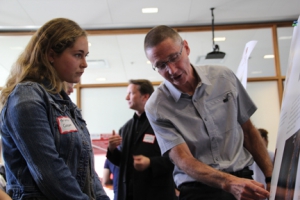Massry Prize winners discuss mechanics of protein movement in cells
By Ryan Ball
Next time you’re sitting in freeway gridlock, consider the complex system of traffic moving through each and every one of your cells — proteins and other molecules all trying get to the right place at the right time to perform a specific function, such as contacting muscles so you can lay on the horn when the distracted driver in front of you doesn’t move.
Uncovering the mechanisms through which that intracellular traffic works earned researchers Michael P. Sheetz, PhD, of Columbia University, James A. Spudich, PhD, of Stanford University and Ronald D. Vale, PhD, of the University of California, San Francisco, the 2013 Massry Prize. … Read More »
Mark Humayun named inaugural director of the USC Eye Institute
By Leslie Ridgeway
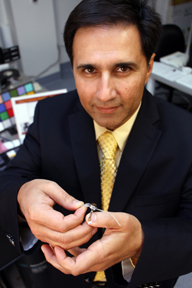 Mark Humayun with the Argus II artificial retina implant.
Mark Humayun with the Argus II artificial retina implant.
(Photo/Jon Nalick)
Mark Humayun, MD, PhD, internationally known for his work on the Argus II artificial retina implant intended to restore sight to the blind, has been named the inaugural director of the USC Eye Institute and interim chair of the USC Department of Ophthalmology.
In his new role, Humayun will take the reins in overseeing advanced surgical techniques and comprehensive care for patients. He will also continue to lead and guide cutting edge transformative research. … Read More »
$4 million grant received to study links between maternal stress and childhood obesity
By Sara Reeve
The National Heart, Lung and Blood Institute has awarded a five-year, $4 million grant to a USC research team to discover whether stress in the lives of working mothers influences risk of childhood obesity in their children.
The project, “Maternal Stress and Children’s Obesity Risk,” led by Genevieve Dunton, PhD, MPH, will monitor stress levels in mothers through a smartphone app, as well as through salivary cortisol. … Read More »
A SAFE HARBOR FOR PATIENTS
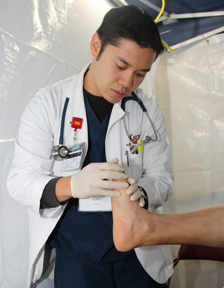 Third-year Keck School of Medicine of USC medical student Martin Tolosa examines a patient at the four-day Care Harbor clinic held Oct. 31 to Nov. 3 at the Los Angeles Memorial Sports Arena.
Third-year Keck School of Medicine of USC medical student Martin Tolosa examines a patient at the four-day Care Harbor clinic held Oct. 31 to Nov. 3 at the Los Angeles Memorial Sports Arena.
(Photo/Jon Nalick)
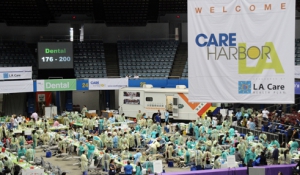 The annual Care Harbor event provides free medical and dental care to hundreds of people who have limited or no access to health care.
The annual Care Harbor event provides free medical and dental care to hundreds of people who have limited or no access to health care.
(Photo/Jon Nalick)
First Zilkha Alzheimer’s Mini-Symposium examines vascular system connections
By Christine Chan and Amy E. Hamaker
Alzheimer’s disease is the sixth leading cause of death in the United States, and more than five million Americans live with the disease, according to the Alzheimer’s Association. Conquering Alzheimer’s was the focus of the first Zilkha Mini Symposium on Alzheimer’s Research at USC.
The symposium, held on Aug. 26 in honor of a visit by the Alzheimer’s Association’s Maria Carrillo, PhD, and Susan Galeas, MSW, MPH, covered a variety of topics, including brain imaging and mapping, genomics, the blood-brain barrier, new therapeutics for Alzheimer’s disease and an overview of clinical research at USC. … Read More »
Faculty-produced cancer education film receives prestigious public health award
By Larissa Puro
 In this screen capture from the short film Tamale Lesson, the fictional Romeo family discusses cervical cancer screening while making tamales for a Quinceanera.
In this screen capture from the short film Tamale Lesson, the fictional Romeo family discusses cervical cancer screening while making tamales for a Quinceanera.
The USC faculty-produced short film Tamale Lesson, which uses narrative storytelling to educate women about cervical cancer screening, received the 2013 APHA Public Health Education & Health Promotion Award for best multimedia material from the American Public Health Association at its annual meeting Nov. 2-6 in Boston.
Cervical cancer is largely preventable and treatable. However, some populations — Latina and Korean women, especially — are not adequately screened, which leads to disproportionately high rates of the disease among them. … Read More »
Experimental drug reduces brain damage, eliminates brain hemorrhaging in rodents afflicted by stroke
By Alison Trinidad
An experimental drug called 3K3A-APC appears to reduce brain damage, eliminate brain hemorrhaging and improve motor skills in older stroke-afflicted mice and stroke-afflicted rats with comorbid conditions such as hypertension, according to a new study from Keck Medicine of USC.
The study, which appears online in the journal Stroke, provides additional evidence that 3K3A-APC may be used as a therapy for stroke in humans, either alone or in combination with the FDA-approved clot-busting drug therapy tPA (tissue plasminogen activator). Clinical trials to test the drug’s efficacy in people experiencing acute ischemic stroke are expected to begin recruiting patients in the United States in 2014. … Read More »
USC STEM CELL SOCIAL
The dessert tray and cheese platter seemed self-renewing at the first USC Stem Cell Social, held on Oct. 25 at the Eli and Edythe Broad CIRM Center for Regenerative Medicine and Stem Cell Research at USC. Nearly 100 guests toured the labs, viewed research posters, voted on their favorite scientific images and mingled with researchers and faculty at this public event hosted by USC Stem Cell and the California Institute for Regenerative Medicine (CIRM) in honor of Stem Cell Awareness Day. … Read More »
Tiny technology may be the future of medicine
By Robert Perkins
Sometimes the smallest tools are required to tackle the biggest problems. At the forefront of innovative research on regenerative medicine and cancer treatment, experts from the top research institutions in the greater Los Angeles area converged for the first-ever UCLA-USC-Caltech Nanotechnology and Nanomedicine Symposium on Oct. 18. … Read More »
USC professor at CHLA awarded $9.5 million by NIH for sickle cell disease research
By Ellin Kavanagh
Thomas Coates, MD, professor of pediatrics and pathology at the Keck School of Medicine of USC and section head of hematology in the division of hematology oncology at Children’s Hospital Los Angeles, along with four other co-principal investigators, recently received a five-year, $9.5 million grant from the National Heart, Lung and Blood Institute of the National Institutes of Health. The award will fund research into the underlying physiology of sickle cell disease (SCD) and identification of biomarkers that will aid in the development of new treatment options. … Read More »
Rare fetal cardiac procedure performed for the first time in Southern California by USC physicians at CHLA
By Lorenzo Benet
A mother and her 25-week-old fetus are doing well after a USC surgeon and pediatrician performed a successful in utero cardiac interventional procedure on the fetus at CHA Hollywood Presbyterian Medical Center late last month.
The minimally invasive procedure, known as a fetal aortic valvuloplasty, was a first for a Southern California hospital. Designed to treat a congenital heart defect known as critical aortic stenosis and evolving hypoplastic left heart syndrome, doctors succeeded in using a tiny balloon to open the fetus’s narrow aortic valve to increase blood flow to the body, improve left heart function and promote normal left heart growth during the critical third trimester growing stage. … Read More »
Cardiovascular symposium takes the pulse of current research
By Jennifer Jing and Cristy Lytal
Researchers addressed the leading cause of death in the United States at the Los Angeles Area Cardiovascular Research Symposium and Research Award Reception, which brought together the region’s cardiovascular specialists to examine the developmental origins of heart health and disease.
Held at The Saban Research Institute of Children’s Hospital Los Angeles, the event was the first meeting of its kind since 1997, when the American Heart Association (AHA) disbanded local chapters in favor of regional affiliates. … Read More »
USC researchers to grow organs to unlock secrets of how cancer tumors develop
By Leslie Ridgeway
Using three-dimensional organ creation, Keck Medicine of USC researchers aim to discover clues to metastatic cancer growth by developing a first-ever integrated bioengineered/computational model of metastatic colon cancer.
David B. Agus, MD, director of the USC Center for Applied Molecular Medicine and professor of medicine at the Keck School of Medicine of USC, is the principal investigator of a $2.3 million, four-year “Provocative Questions” grant awarded recently by the National Cancer Institute (NCI), a division of the National Institutes of Health (NIH). The project title is “An Integrative Computational and Bioengineered Tissue Model of Metastasis.” … Read More »
Halloween on the Health Sciences Campus!
Halloween celebrations for kids of all ages took place on the Health Sciences Campus last week, both for spooky fun and to raise awareness for health research initiatives.
Drug reduces brain damage, hemorrhaging in rodents afflicted by stroke
By Alison Trinidad
An experimental drug called 3K3A-APC appears to reduce brain damage, eliminate brain hemorrhaging and improve motor skills in older stroke-afflicted mice and stroke-afflicted rats with comorbid conditions such as hypertension, according to a new study from Keck Medicine of USC.
The study, which appears online in the journal Stroke, provides additional evidence that 3K3A-APC may be used as a therapy for stroke in humans, either alone or in combination with the FDA-approved clot-busting drug therapy tPA (tissue plasminogen activator). Clinical trials to test the drug’s efficacy in people experiencing acute ischemic stroke are expected to begin recruiting patients in the United States in 2014. … Read More »
Open enrollment an opportunity to choose Keck Medicine physicians
Open enrollment for benefits-eligible faculty and staff of the University has begun, and personnel are encouraged to choose Keck Medicine of USC providers by signing up for the USC Network Medical Plan. … Read More »
Researchers at USC uncover new possibilities for sweat gland stem cells
By Marie Rippen
Sweat is important — without it, we would overheat and die. In a recent paper in the journal Public Library of Science One (PLOS ONE), USC faculty member Krzysztof Kobielak, MD, PhD, and a team of researchers explored the ultimate origin of this sticky, stinky but vital substance — sweat gland stem cells. … Read More »
Keck students, benefactors celebrate success at Scholarship Luncheon
By Ryan Ball
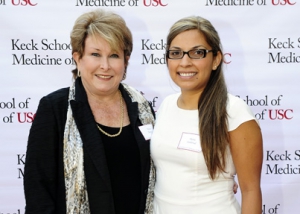 Donor Norene Zapanta with Maria Sandoval, recipient of the scholarship named for Zapanta’s late husband, Edward Zapanta, a USC neurosurgeon and the first Hispanic member of the USC Board of Trustees.
Donor Norene Zapanta with Maria Sandoval, recipient of the scholarship named for Zapanta’s late husband, Edward Zapanta, a USC neurosurgeon and the first Hispanic member of the USC Board of Trustees.
(Photo/Steve Cohn)
The daughter of undocumented immigrants, Maria Sandoval credits excellent mentoring for helping her become the first member of her family to graduate high school and college. Now in her third year at the Keck School of Medicine of USC, she’s getting another boost in her quest to become a primary care physician and practice in her underserved community in the San Fernando Valley.
Sandoval is the recipient of this year’s scholarship named for Edward Zapanta, MD, the late USC neurosurgeon and first Hispanic member of the USC board of trustees. She recently had to the opportunity to thank Norene Zapanta for continuing her husband’s support of Hispanic medical students. The two shared a meal at the Keck School’s annual Scholarship Luncheon, held on Oct. 2 on the Harry and Celesta Pappas Quad. … Read More »
Keck School researchers awarded grant to study Kaposi’s sarcoma-associated herpesvirus
By Jon Nalick
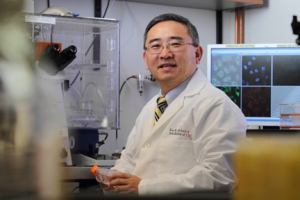 Principal investigator Jae Jung received a $7.5 million grant to help discover how to short circuit development of Kaposi’s sarcoma.
Principal investigator Jae Jung received a $7.5 million grant to help discover how to short circuit development of Kaposi’s sarcoma.
(Photo/Phil Channing)
The National Institutes of Health (NIH) have awarded Keck School of Medicine of USC researchers a five-year, $7.5 million grant to investigate how Kaposi’s sarcoma-associated herpesvirus (KSHV) evades the immune system and triggers certain cancers.
Principal investigator Jae Jung, PhD, the Fletcher Jones Foundation Chair and Hastings Foundation Professor of Molecular Microbiology and Immunology at the Keck School, said the research aims to find ways to short circuit the development of Kaposi’s sarcoma. This malignant tumor, often caused by KSHV, is more prevalent among people with compromised immune systems, such as patients with AIDS. … Read More »


